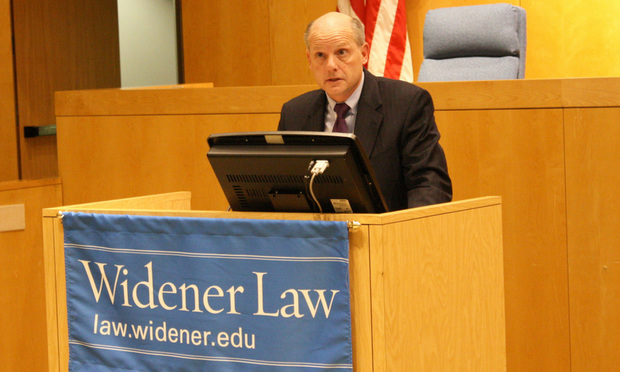Strine Tells Del. Lawmakers to 'Think Boldly' About Funding for Downstate Court Buildings
Strine in recent years has made the plea a staple of his annual request to members of the General Assembly's Joint Finance Committee, the legislative panel panel tasked with writing the state's appropriations bills.
February 13, 2019 at 06:00 PM
4 minute read
The original version of this story was published on Delaware Law Weekly
 Chief Justice Leo E. Strine.
Chief Justice Leo E. Strine.
Delaware Supreme Court Chief Justice Leo E. Strine Jr. on Wednesday called on lawmakers to “think boldly” in allocating funds for the Judiciary's biggest capital project, renewing calls to accelerate the construction of two new Family Court facilities in Kent and Sussex counties.
Strine in recent years has made the plea a staple of his annual request to members of the General Assembly's Joint Finance Committee, the legislative panel panel tasked with writing the state's appropriations bills.
Strine said the project, estimated to cost between $150 million and $200 million, was desperately needed to address security and other concerns at the current facilities, where there is no way to separate litigants, and judges are forced to use the same elevator as prisoners. But he warned Wednesday that if funding continues at current levels, it would take at least 10 years to complete the courthouse in Sussex County.
The lack of a comprehensive investment from the state, he said, was particularly frustrating, given the role of the legal services industry in propping up the formation of business entities—which accounts for 40 percent of the state's revenue.
“What we're urging you to do is to think boldly,” he said. “We can do this in a fiscally responsible way. It is our major industry.”
“If this was the Port, or this was Chemours, how many dollars would we throw at it per job? Well, we need to start looking at legal services in the same way, especially because when an industry is your number one producer of revenue, you might give it a little love.”
The Judiciary plans have the two courthouses in tandem, and in a similar design, in order to save on costs.
Officials have already started the process of buying land, and it is actively exploring the possibility of public-private partnerships to build and maintain the two courthouses. Strine said that approach could get the facilities built quicker, but it would also straddle the state with long-term obligations to pay them off.
Strine also acknowledged that the Family Court should have been incorporated into the Kent County Courthouse, saying the Judiciary held part of the blame
“If we put another floor on it and put the Family Court in there and had space for the [Justice of the Peace] Court, we would be done,” in Kent County, he said. “The Judiciary is part of the reason that didn't happen. We didn't always play well with each other.”
The JFC, which has been holding hearings with state agencies to mark up Gov. John Carney's recommended budget, does not authorize capital expenditures. That task is left to the Bond Committee, which is scheduled to hold similar meetings in April.
But Strine said the work of the two committees was intertwined and that the Judiciary planned to prevent a more concrete proposal to both panels in the near future.
As for the Judiciary's operating requests, Strine asked lawmakers to convert three contracted court interpreter positions to full-time, salaried jobs and to increase state funding for legal services to the poor.
Meanwhile, state Attorney General Kathy Jennings met with the same committee Wednesday to outline her budget priorities for the Department of Justice. Among her requests were proposals to increase the pay of DOJ lawyers and to have the state cover their required bar dues.
Jennings, who took office in January, also said she was preparing a loan forgiveness proposal to present next year as a tool for recruiting and retaining high-caliber attorneys.
Lawmakers are required to pass a final budget for the 2020 fiscal year by July 30.
This content has been archived. It is available through our partners, LexisNexis® and Bloomberg Law.
To view this content, please continue to their sites.
Not a Lexis Subscriber?
Subscribe Now
Not a Bloomberg Law Subscriber?
Subscribe Now
NOT FOR REPRINT
© 2025 ALM Global, LLC, All Rights Reserved. Request academic re-use from www.copyright.com. All other uses, submit a request to [email protected]. For more information visit Asset & Logo Licensing.
You Might Like
View All

Chancery: Common Stock Worthless in 'Jacobson v. Akademos' and Transaction Was Entirely Fair
5 minute read
Trending Stories
- 1ACC CLO Survey Waves Warning Flags for Boards
- 2States Accuse Trump of Thwarting Court's Funding Restoration Order
- 3Microsoft Becomes Latest Tech Company to Face Claims of Stealing Marketing Commissions From Influencers
- 4Coral Gables Attorney Busted for Stalking Lawyer
- 5Trump's DOJ Delays Releasing Jan. 6 FBI Agents List Under Consent Order
Who Got The Work
J. Brugh Lower of Gibbons has entered an appearance for industrial equipment supplier Devco Corporation in a pending trademark infringement lawsuit. The suit, accusing the defendant of selling knock-off Graco products, was filed Dec. 18 in New Jersey District Court by Rivkin Radler on behalf of Graco Inc. and Graco Minnesota. The case, assigned to U.S. District Judge Zahid N. Quraishi, is 3:24-cv-11294, Graco Inc. et al v. Devco Corporation.
Who Got The Work
Rebecca Maller-Stein and Kent A. Yalowitz of Arnold & Porter Kaye Scholer have entered their appearances for Hanaco Venture Capital and its executives, Lior Prosor and David Frankel, in a pending securities lawsuit. The action, filed on Dec. 24 in New York Southern District Court by Zell, Aron & Co. on behalf of Goldeneye Advisors, accuses the defendants of negligently and fraudulently managing the plaintiff's $1 million investment. The case, assigned to U.S. District Judge Vernon S. Broderick, is 1:24-cv-09918, Goldeneye Advisors, LLC v. Hanaco Venture Capital, Ltd. et al.
Who Got The Work
Attorneys from A&O Shearman has stepped in as defense counsel for Toronto-Dominion Bank and other defendants in a pending securities class action. The suit, filed Dec. 11 in New York Southern District Court by Bleichmar Fonti & Auld, accuses the defendants of concealing the bank's 'pervasive' deficiencies in regards to its compliance with the Bank Secrecy Act and the quality of its anti-money laundering controls. The case, assigned to U.S. District Judge Arun Subramanian, is 1:24-cv-09445, Gonzalez v. The Toronto-Dominion Bank et al.
Who Got The Work
Crown Castle International, a Pennsylvania company providing shared communications infrastructure, has turned to Luke D. Wolf of Gordon Rees Scully Mansukhani to fend off a pending breach-of-contract lawsuit. The court action, filed Nov. 25 in Michigan Eastern District Court by Hooper Hathaway PC on behalf of The Town Residences LLC, accuses Crown Castle of failing to transfer approximately $30,000 in utility payments from T-Mobile in breach of a roof-top lease and assignment agreement. The case, assigned to U.S. District Judge Susan K. Declercq, is 2:24-cv-13131, The Town Residences LLC v. T-Mobile US, Inc. et al.
Who Got The Work
Wilfred P. Coronato and Daniel M. Schwartz of McCarter & English have stepped in as defense counsel to Electrolux Home Products Inc. in a pending product liability lawsuit. The court action, filed Nov. 26 in New York Eastern District Court by Poulos Lopiccolo PC and Nagel Rice LLP on behalf of David Stern, alleges that the defendant's refrigerators’ drawers and shelving repeatedly break and fall apart within months after purchase. The case, assigned to U.S. District Judge Joan M. Azrack, is 2:24-cv-08204, Stern v. Electrolux Home Products, Inc.
Featured Firms
Law Offices of Gary Martin Hays & Associates, P.C.
(470) 294-1674
Law Offices of Mark E. Salomone
(857) 444-6468
Smith & Hassler
(713) 739-1250







